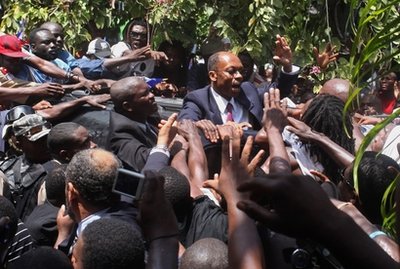Aristide says Restoring Haitian Military will Lead to Misery - Staff Acknowledges U.S. Abduction in 2004
/Haiti's former President Jean-Bertrand Aristide waves to supporters as he arrives home in Port-au-Prince, Haiti, Friday March 18, 2011.
From [Democracy Now] JEAN-BERTRAND ARISTIDE: Well, I can, as I said, from my position as a simple citizen, investing in education, continue to talk about human rights. If you are a police, you respect the rights of the people, and the people respect your rights, as well, because you are a human being. With a police force, respecting the rights of the Haitian people, ones who are moving, slowly but surely, from misery to dignity—to poverty with dignity—that was a very slow move, from misery to poverty with dignity. But if we decide to go back, when we had an army of 7,000 soldiers controlling 40 percent of the national budget, that would mean we are headed back to misery instead of doing something to move from that misery to poverty with dignity. When we remember how many people were killed by the then-army, do we want to go back to have the same, moving from the same to worse, when we know that the victims are still suffering—the fathers, mothers, friends [inaudible] who were killed—and they still don’t have justice? When we teach, when we educate, we focus on human rights, the rights of every single citizen, and we also avoid structures which can violate human rights instead of protecting human rights. The future of Haiti must be linked to the respect of the rights of every single citizen.
The Kidnapping by U.S.
From [HERE] AMY GOODMAN:—where the Aristides were sent in the coup in 2004. And then, after the earthquake, we saw you at the airport. Talk about the significance of this day. You were with them—you went with them to the Central African Republic.
FRANTZ GABRIEL: I did. That was immediately after the kidnapping.
AMY GOODMAN: Who kidnapped?
FRANTZ GABRIEL: We were kidnapped right out of this house. It was early in the morning, and they took us in a unmarked aircraft all the way to—
AMY GOODMAN: Who took you?
FRANTZ GABRIEL: The military, the U.S. military. Yeah. They took—
AMY GOODMAN: From the U.S. embassy here. Luis Moreno?
FRANTZ GABRIEL: Luis Moreno was the political attaché, and he was—actually he was the one that penetrated—I mean, knocked out the door, and then we opened up. And he said to the President, he said, "President Aristide, you know, 10 years ago I was here to welcome you when you came back from exile. I’m sorry that I’m the one that has to accompany you today." And that’s how we left the house, and we ended up at the airport in a big white plane with no registration number and a big American flag. And then, you know, we took off, and then, you know, like, we ended up in Central Africa after a few stops.













































































































































































































































































